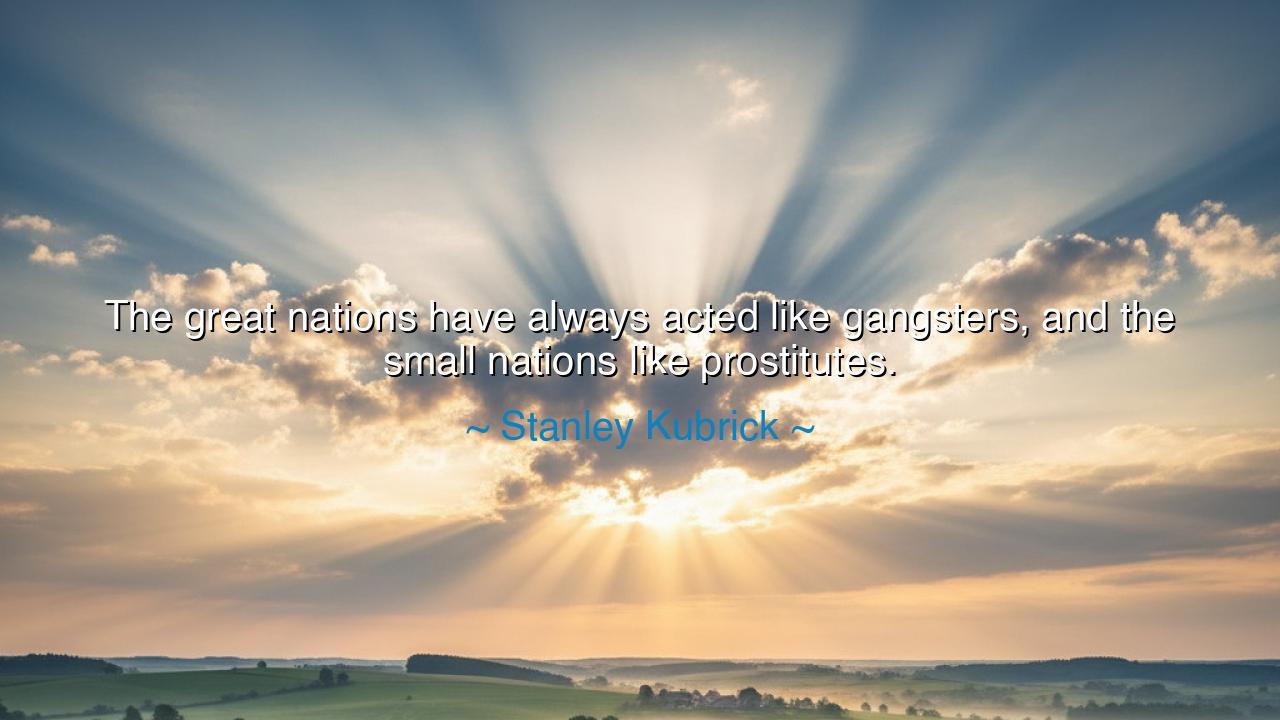
The great nations have always acted like gangsters, and the small
The great nations have always acted like gangsters, and the small nations like prostitutes.






The words “The great nations have always acted like gangsters, and the small nations like prostitutes,” spoken by Stanley Kubrick, strike with the force of a thunderclap against the illusions of civilization. Beneath their cynical surface lies a raw and uncomfortable truth — that power corrupts, and that in the great theater of history, morality often bows before ambition. Kubrick, who observed humanity through the unflinching eye of his art, exposes the tragic symmetry between nations and individuals: those with might become predators, and those without must bend to survive. His statement is not merely political; it is existential — a lament for the moral decay that follows the lust for dominance.
From the dawn of empire, the powerful have cloaked conquest in the language of justice. Rome called it “civilization.” Britain called it “commerce.” America calls it “freedom.” But beneath each noble banner lay the same ancient hunger — the will to control, to expand, to dictate. Kubrick’s use of the word “gangsters” is no accident; it evokes the lawless charm of those who rule not by right, but by fear. Just as the gangster demands tribute under threat, so too have great nations demanded allegiance from weaker ones. And in their shadow, the small nations — caught between survival and surrender — have often been forced to sell their autonomy, trading dignity for protection, just as “prostitutes” trade intimacy for coin.
The ancients knew this pattern well. The historian Thucydides, writing of the Peloponnesian War, recorded the dialogue between mighty Athens and the small island of Melos. When the Melians appealed to justice, the Athenians replied coldly: “The strong do what they can, and the weak suffer what they must.” It was the same then as Kubrick saw it millennia later — the eternal rhythm of domination and submission. Athens, the “great nation,” claimed moral purpose, yet slaughtered those who refused submission. Melos, the “small nation,” clung to ideals, yet paid for them with blood. In this, Kubrick’s quote echoes through time: the stage changes, but the play remains the same.
In the modern age, his words find new life in the aftermath of the world wars and the rise of superpowers. Kubrick lived through an era where propaganda disguised imperialism, where the Cold War turned the earth into a chessboard of nations, and where alliances were brokered not by virtue, but by convenience. The great nations — America, the Soviet Union, the empires of the past — acted as “gangsters”, carving the globe into spheres of influence, extracting obedience through threats or promises. Meanwhile, the smaller nations, stripped of sovereignty, often traded loyalty to one master for protection from another. Independence became illusion, freedom became performance. The actors changed; the script did not.
And yet, Kubrick’s insight goes beyond politics. It is a mirror to human nature itself. For nations are but reflections of the people who lead them. When man seeks greatness without conscience, he becomes the gangster; when he abandons self-respect for safety, he becomes the prostitute. The struggle between morality and survival exists within us all. How many, when faced with fear or ambition, choose power over principle or comfort over courage? The same corruption that stains empires also resides in hearts. It is the same hunger that drives conquest, and the same weakness that enables tyranny. Thus, Kubrick’s words are not only a condemnation of systems, but a warning to souls.
Consider the rise and fall of Napoleon Bonaparte, who began as a liberator and ended as a conqueror. He spoke of equality and justice, yet his empire devoured Europe. He was both genius and gangster — a man whose brilliance was consumed by appetite. In his shadow, the smaller kingdoms either submitted or betrayed one another to survive, proving again that power seduces and weakness tempts. And when Napoleon fell, Europe, exhausted and humiliated, rebuilt itself not through righteousness but through pragmatism — the eternal dance between domination and dependence.
So, my children, let this be the lesson you carry: power without virtue becomes tyranny, and weakness without integrity becomes servitude. The measure of a nation — and of a soul — is not in its might, but in its restraint. Do not envy the “gangsters” of history, for their thrones are built on fear and crumble in time. Do not pity the “prostitutes” either, but learn from their suffering — that compromise without dignity corrodes the spirit. The true greatness of a nation, like that of a person, lies not in its ability to command, but in its courage to stand for justice even when weak, and to show mercy even when strong.
For the world will always tempt you to act like the gangster or to bow like the prostitute. But the path of wisdom — the path of balance — is to remember that strength and virtue must walk hand in hand. Empires may rise, and nations may fall, but character endures. And though history may echo with the roar of the powerful, it is the quiet integrity of the just that keeps the world from collapsing into darkness. Let power serve truth, and let truth outlive power.






AAdministratorAdministrator
Welcome, honored guests. Please leave a comment, we will respond soon